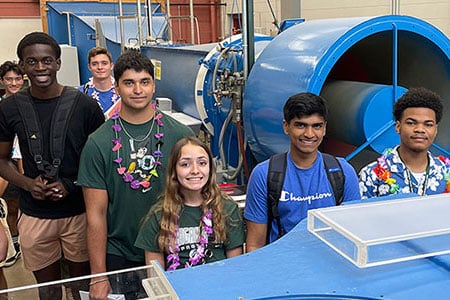Ian Gonzalez-Afanador, a Ph.D. student in the Michigan State University College of Engineering, has been selected for the prestigious National Science Foundation Graduate Research Fellowship Program (GRFP).

Gonzalez-Afanador is a second year Ph.D. student in the Department of Electrical and Computer Engineering. He will use the NSF fellowship to continue his research on the development of sensors for the detection of invasive sea lamprey in the Great Lakes and the development of piezoelectric-based anti-fouling systems for light sources used in algal cultivation.
Originally from Manatí, Puerto Rico, Gonzalez-Afanador went to Mayagüez Educational Opportunities Residential Center, a public boarding high school specializing in science and math. He did his undergraduate studies at the University of Puerto Rico - Mayagüez, majoring in electrical engineering with a focus on control systems and analog circuit design.
He has had internships with Honeywell Aerospace and Lockheed-Martin Sikorsky and has participated in summer research programs at the University of Virginia, Michigan State, and Georgia Tech.
Gonzalez-Afanador is a student in the research group of ECE Professor Nelson Sepulveda.
Sepulveda said Gonzalez-Afanador will continue adapting interdigitated electrode (IDE) sensors that he developed for lamprey detection - providing real-time monitoring of underwater biological accumulation, commonly referred to as biofouling. The project focuses on optimizing the design of the IDE sensors, exploring different geometries and material combinations to find an adequate balance between sensor sensitivity, cost and ease of manufacturing.
The final stage of the project includes demonstrating a practical application of the devices as a feedback signal for an anti-biofouling system in an algal cultivation setting. This has the potential to reduce operational costs and maintenance downtimes associated with algae farming making algae-derived products such as biofuels, animal feed and pharmaceutical compounds cheaper and more accessible, Sepulveda added.
The NSF GRFP is the country's oldest graduate fellowship program. It recognizes and supports outstanding graduate students in NSF-supported STEM disciplines who are pursuing research-based master's and doctoral degrees at accredited U.S. institutions. The five-year fellowship includes three years of financial support including an annual stipend of $34,000 and a cost of education allowance of $12,000 to the institution.





